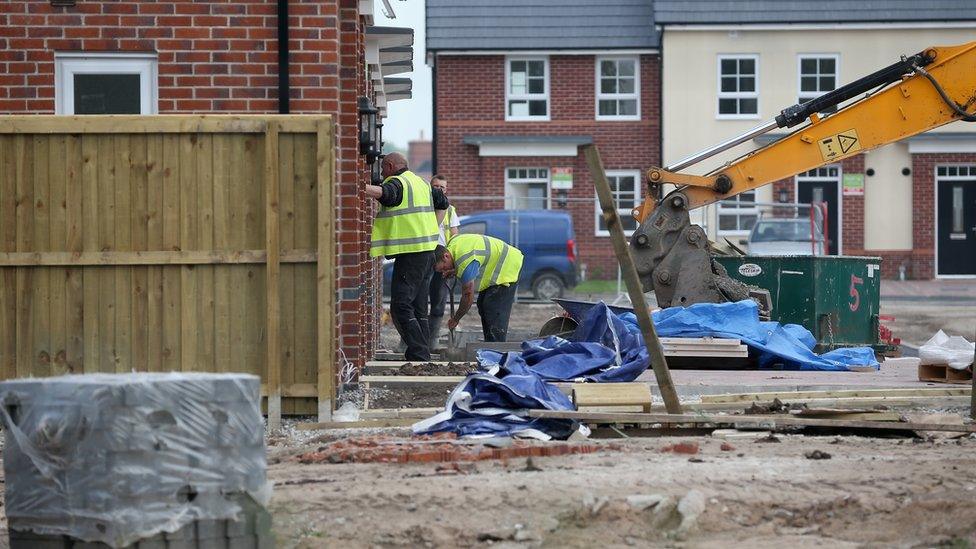Ministers ignored 'slums of the future' warnings, says adviser
- Published

Housing Secretary Robert Jenrick ignored warnings about "slums of the future" in an official report on planning reforms, its co-author says.
Dr Ben Clifford raised concerns over the "health, wellbeing and quality of life" of people living in tiny flats converted from vacant offices.
But he said he was not asked to discuss his report's findings , externalwith ministers.
The government instead pushed ahead with further de-regulation of England's planning system.
Officials say allowing developers to bypass traditional planning permission to convert offices into flats has created more than 60,000 badly-needed new homes in the past four years.
Mr Jenrick has now extended the policy, known as Permitted Development, to allow some buildings to be extended upwards, or demolished, without planning permission.
Vacant town centre premises can also be converted into homes, cafes and restaurants, under the new rules.
'Social life'
And on Thursday, Mr Jenrick is expected to set out further reforms, to give developers in England "automatic" permission to build homes and hospitals on land earmarked for "renewal".
Permitted Development rights were introduced in 2013, removing local authority control over office-to-flat conversions, unless there are demonstrable concerns about issues such as flooding or contamination.
But Dr Clifford, associate professor of planning at University College London, found many of the homes created under the new rules do not meet national guidelines for minimum living space.
Some of the homes were just 16 square metres - and a number of them had no windows.
Dr Clifford told the BBC "we're going to get further proliferation of these small units of 16, even 20 metre squared, which just aren't adaptable, aren't suitable to enjoy a high quality of personal and social life".
He said the phrase "slums of the future" cropped up repeatedly when interviewing councillors as part of his research.
It was also the title of a report by a Labour London assembly member, external cited in Dr Clifford's report.
'No follow-up'
The UCL research was commissioned by Mr Jenrick's predecessor as Communities Secretary, James Brokenshire, amid concerns from Theresa May's government about the size of new homes.
Dr Clifford and his colleagues visited more than 600 buildings across the country which had been converted under Permitted Development rights.
They found almost 70% were one bedroom flats or studios.

Some developments see residents living next to industrial land
Just over 73% of homes which had gone through the full planning system met the current non-binding space standard of 37 square metres, compared with 22% created through Permitted Development rights, the report said.
According to Dr Clifford, "there was no follow-up so we didn't have engagement with the ministry as to any further discussion as to the content of the report, our findings".
He added: "We need to establish what are acceptable minimums and set them out very clearly, and that should apply to all new development that are coming forward…it's a race to the bottom if we continue like this".
Dr Clifford's 320-page report was delivered to the Ministry of Housing, Communities and Local Government in January.
'Little attention'
But it was not published until 21 July - the same day that Mr Jenrick published new regulations expanding the use of Permitted Development rights.
It was also the same day that the much-delayed report into alleged Russian interference into UK democracy was published.
There was no press release announcing the publication of the Clifford report.
Dr Clifford said it gave the impression that the ministry was "trying to slip something out with as little notice and as little attention drawn to it as possible".
The Ministry for Housing, Communities and Local Government rejected suggestions the report had been buried, saying it had been widely covered in the media.
The department said Permitted Development schemes still had to conform to building regulations, external, covering issues such as sanitation, fire safety, sound proofing and standards of workmanship.
'Highest possible standards'
But it said it recognised the concerns raised in the report about the poor quality of some schemes and it expected developers to "take note" of where their schemes face local criticism.
A spokesperson said: "Permitted development rights make an important contribution to building the homes our country needs and are crucial to helping our economy recover from the pandemic by supporting our high streets to adapt and encouraging the regeneration of disused buildings.
"This independent research shows on average there was little difference in the appearance, energy performance or access to services between schemes delivered through permitted development and those that were granted full planning permission.
"All developers should meet the highest possible design standards and the changes we are making will continue to improve the quality of these homes, including new requirements for natural light and checks to ensure changes are in keeping with the character of their local area."
- Published2 August 2020
